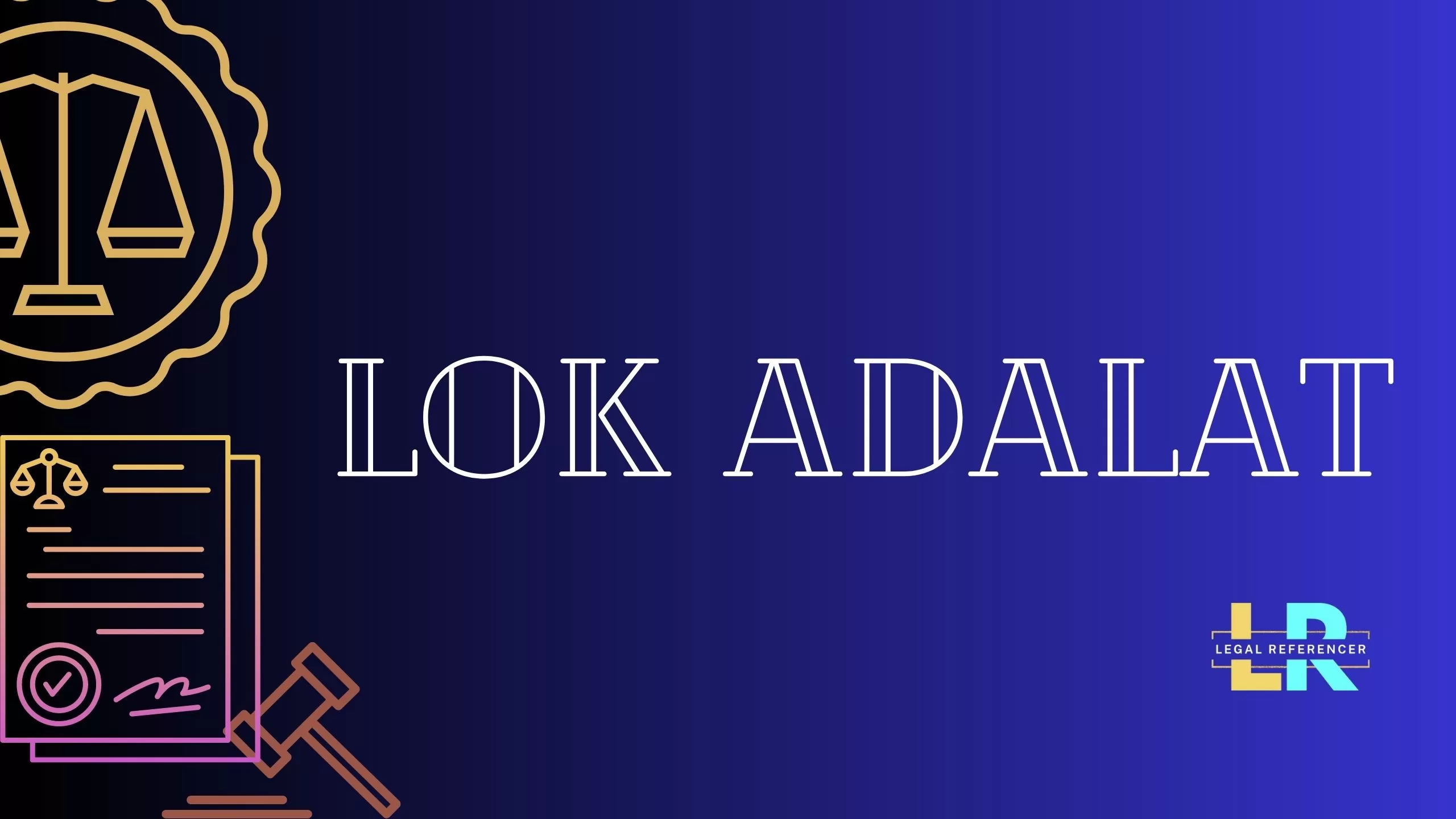Introduction
Lok Adalat stands as a distinct and innovative alternative orchestrating a gathering of conflicting parties outside the conventional courtroom arena to settle their disputes. Firmly rooted in the principles espoused by Gandhi those of non-violence and harmonious resolution Lok Adalat carves out a space where parties can express their concerns by engaging in dialogue and ultimately reach a solution that satisfies all involved parties.
In the heart of this article, we shall exprole the concept of its operational mechanics know the standout features that set it apart and immerse ourselves in the myriad benefits it bestows upon its participants. Get ready to embark on a voyage through the exceptional realm of the Lok Adalat procedure in India a realm where parties find their voices and disputes find resolution.
Also Read: ALTERNATE DISPUTE RESOLUTION SYSTEM (ADR)- SEM VI- 2019-20 – LLB- SOLVED QUESTION PAPER
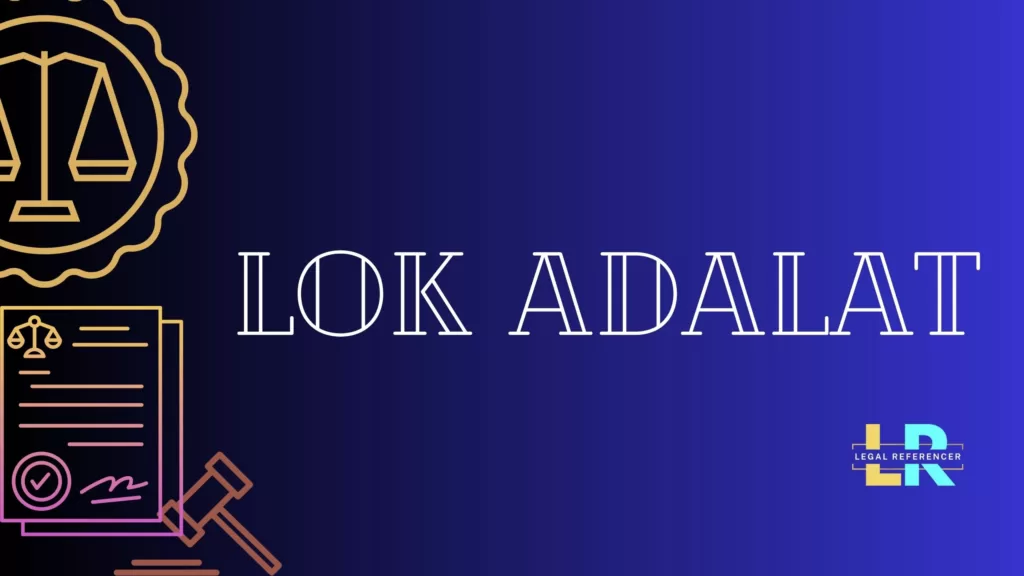
What is Lok Adalat?
Lok Adalat, a term hailing from the Hindi lexicon, translates to “People’s Court” or “People’s Tribunal”. Rooted in the concepts of conciliation, mediation and compromise, it serves as a distinctive tool for resolving disputes outside the traditional legal framework. Lok Adalats offer disputing parties a refuge from the labyrinthine world of court battles sparing them the hefty investments of time, money and effort. Instead they provide a platform where adversaries can harmoniously settle their differences without the courtroom theatrics. This exceptional forum champions swiftness and efficacy in seeking justice all while nurturing the spirit of resolution. As of September 30, 2015, a whopping 15.14 lakhs Lok Adalats have been thrown on the stage all across the country since they first made their grand entrance. More than a mind-blowing 8.25 crore cases have been tidied up and settled through this nifty mechanism.
Decisions forged within the realm of Lok Adalats hold a special sway owing to their status under the aegis of the Legal Services Authorities Act, 1987. These decisions metamorphose into decrees akin to those emanating from civil courts weighty and definitive for all parties involved. Yet within this realm, the path to appeal is closed. Should dissatisfaction fester, recourse is granted by way of litigation in the standard courts, where the labyrinth of the legal system awaits.
A notable feature that colors the Lok Adalat canvas is the exemption from the burdensome court fees when initiating proceedings. Moreover, in instances where a dispute, initially ensnared in the coils of the court finds resolution within Lok Adalat’s chambers, the original court fees, akin to a phoenix, rise from the ashes, returning to the litigants’ pockets. The custodians of Lok Adalats, the statutory conciliators, don’t don judicial robes. Rather they don the mantle of persuasion, advocating for amicable settlements that eschew the shadows of threats and coercion.
The Lok Adalat does not stand as the ultimate arbiter, impartial and resolute. Instead, it becomes a canvas on which the parties themselves wield the brush of compromise, painting their own resolutions. The architects of change, statutory conciliators, guide these painters toward an equilibrium where their colors blend seamlessly.
The saga of Lok Adalat finds its prologue in the Legal Services Authorities Act of 1987, a script that came to life on November 9, 1995. From these legislative loins was birthed the National Legal Services Authority (NALSA) an embodiment of standardization and comprehensiveness. Its mission: to extend a benevolent arm to the underprivileged echelons of society, offering legal succor without the weight of cost. The narrative deepened in 2002, when the legislative script underwent an edit, ushering in the era of Permanent Lok Adalats. These like sentinels, were entrusted with the task of resolving disputes tethered to public utility services.
The members of Lok Adalats perform their roles on the stage of impartiality and independence, steering the ship toward amicable shores. Here, persuasion trumps imposition; facilitation reigns over diktat. In this process, justice morphs from an abstract ideal to a tangible goal. Members, like conduits of equanimity, urge parties to navigate the labyrinth of disagreement, emerging on the other side with resolutions that bear the hallmark of amicability.
Origin and Legal Framework of Lok Adalat
The origins of Lok Adalats can be traced back to the time honored Indian tradition of resolving conflicts through communal engagement. Nevertheless the contemporary rendition of Lok Adalats gathered momentum following the enactment of the Legal Services Authorities Act in 1987.
Lok Adalats were established as legal entities vested with the authority to adjudge and settle disputes under the aegis of this Act, . Through subsequent amendments the Legal Services Authorities Act laid the concrete groundwork for the functioning and jurisdiction of Lok Adalats in India.
Types of Cases Lok Adalat Deals With
- Civil Cases: Lok Adalats address civil disputes such as property disputes, landlord-tenant disputes, contractual disputes, partnership disputes, inheritance disputes, and other civil matters. These cases generally involve various matters specifically relating to individuals, businesses or organizations seeking resolution through negotiation and compromise.
- Family Disputes: Lok Adalats provide a platform for resolving family-related conflicts and disputes. Family matters may include matrimonial disputes such as divorce, child custody, maintenance demands and property division among divorcing couples. Lok Adalats focus on promoting amicable settlements and also restoring family harmony.
- Compoundable Criminal Cases: Lok Adalats have jurisdiction over criminal cases that are compoundable under the law. Compoundable offenses are those where the complainant/victim agrees to enter into a compromise with the accused and the law if it feels better, allows for the withdrawal of charges or settlement through mutual agreement. Examples of compoundable offenses include minor offenses like theft, mischief, defamation and certain sections of the Indian Penal Code.
- Motor Accident Claims: Lok Adalats play a significant role in resolving motor accident compensation claims. These kind of cases includes disputes related to personal injury, property damage and insurance claims arising from road accidents. Lok Adalats help to facilitate settlements that consider the damages suffered by the victim and the financial liability of the parties involved.
- Land Acquisition Disputes: Types of cases where land acquisition by the government or by any other authority becomes a subject of dispute; Lok Adalats provide an effective platform for negotiation and resolution. The party having objection or raising dispute may opt for Lok Adalat as an alternative to save the time and money to be spent in regular court set up. Land acquisition disputes generally involve issues related to compensation, rehabilitation, encroachment and disputes arising from the land acquisition process.
- Public Utility Service Disputes: Disputes related to public utility services may also be refered to the Lok adalat, such as electricity bills, water bills, telephone bills and other utility-related matters etc. The major aim of these kind of cases is to find a mutually acceptable solution that benefits both the service provider and the consumer.
- Other Civil and Criminal Cases: Lok Adalats also have the authority to handle the other wide range of civil and criminal cases that fall within their jurisdiction. These kind of cases may include disputes related to debt recovery, commercial disputes, consumer disputes, encroachments on forest lands, revenue matters and various other civil and criminal matters which can be resolved through negotiation and compromise.
It is important to note that the Lok Adalats do not have jurisdiction over non-compoundable offenses, non-compoundable offenses are those that are considered more severe or have specific legal restrictions against the settlement. These offenses typically involve crimes against the state, public order, or offenses of a serious nature.
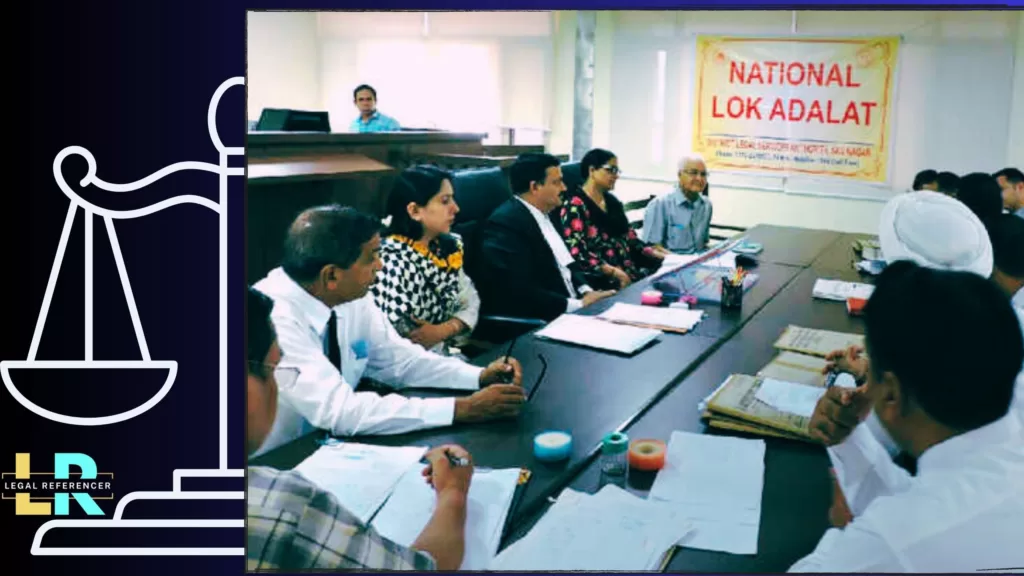
Types of Lok Adalats
In India, various types of Lok Adalats have been established to cater to specific categories of cases, ensuring accessible and efficient justice for all.
1. Permanent Lok Adalats
Permanent Lok Adalats are created under the Legal Services Authorities Act of 1987 to resolve specific types of disputes. These lok adalats have authority over public utility services such as transportation, postal services and telegraph services.
They have the same powers as a Civil Court and are presided over by a sitting or retired judicial officer.
Permanent Lok Adalats ensure that issues are resolved quickly and conveniently for all parties concerned.
2. National Lok Adalat
National Lok Adalat is an unique initiative by the Indian government aiming to reduce the burden of pending cases across the country. It is conducted on specific days as specified by the National Legal Services Authority (NALSA). The National Lok Adalat aims to encourage compromise and settlement offering an opportunity to resolve a vast number of cases expeditiously. By making justice accessible to al this initiative promotes the principle of “justice at the doorstep” .
3. State Lok Adalat
State Lok Adalats operate at the state level and focus on resolving disputes that are pending before various courts within the jurisdiction of the respective state. These adalats are organized by the State Legal Services Authorities (SLSA) and serve as an alternative forum for litigants to seek resolution.
4. Mega Lok Adalat
Mega Lok Adalat is an extended version of the National Lok Adalat. It mainly aim to address a large number of cases pending in various courts and tribunals within a specific jurisdiction. The Mega Lok Adalat brings together multiple Lok Adalats, including Permanent Lok Adalats, to handle a substantial volume of cases on a single day.
5. Mobile Lok Adalat
The Mobile Lok Adalat is a very progressive concept that takes the Lok Adalat system to the doorstep of the interested litigants. It involves the establishment of temporary Lok Adalat. It centers in the different locations to cater to the needs of people who may face challenges in accessing regular courts. The Mobile Lok Adalat plays very important role ito reach out the remote areas for ensuring easy access to justice for all irrespective of their geographical location.
6. Lok Nyayalayas
Lok Nyayalayas are decentralized village courts established to provide affordable and easily accessible justice to the rural population. These courts operate at the grassroots level that follow simplified procedures. Lok Nyayalayas aim to resolve disputes amicably, focusing on the principles of natural justice and fair play. By establishing Lok Nyayalayas the legal system strives to bridge the gap between the litigants residing at rural areas and the formal judicial system.
6. Industrial Lok Adalats
Industrial Lok Adalats are specialized Lok Adalats that focus on resolving industrial disputes by promoting industrial harmony by addressing conflicts between employers and employees outside the regular court. Industrial Lok Adalats have jurisdiction over matters related to employment, labor rights, wages, and other industrial disputes. By providing a quick and efficient resolution mechanism Industrial Lok Adalats contribute to a conducive working environment.
7. Online Lok Adalats
The advancement of technology in general has given rise to Online Lok Adalats which utilize digital platforms for dispute resolution such as vedio conferencing. Online Lok Adalats leverage video conferencing and other online tools to facilitate the settlement of disputes. This modern approach offers convenience particularly for parties located in different geographical locations. Online Lok Adalats save time and resources while ensuring accessibility and efficiency in the resolution process.
8. Public Utility Services Lok Adalats
Public Utility Services Lok Adalats specialize in resolving disputes related only to essential services such as water supply, electricity, healthcare and transportation. These Lok Adalats aim to expedite the resolution of grievances concerning public utility services only. These Lok adalats provide swift and cost effective mechanism of dispute resolution ensuring the wellbeing of the general public.
9. Special Lok Adalats
Special Lok Adalats are organized to deal with specific categories of cases tailoring the approach to meet their unique requirements. These adalats address matters such as motor vehicle accident claims, land acquisition disputes and family matters etc. By focusing on specific types of cases Special Lok Adalats streamline the resolution process ensuring specialized attention and timely justice.
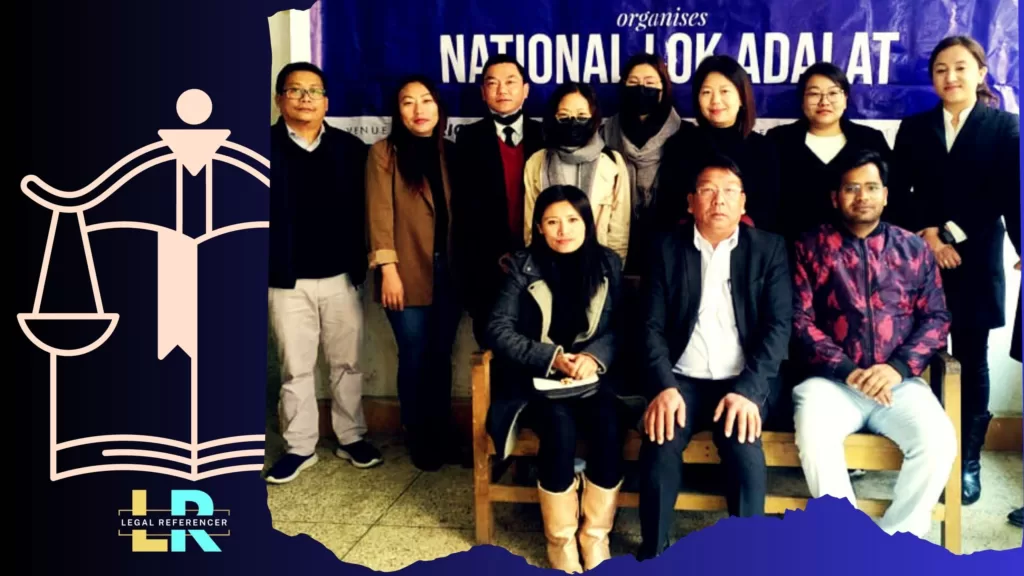
Levels and Composition of Lok Adalats:
The composition of Lok Adalats varies at different levels, ensuring a fair and inclusive approach to justice.
State Authority Level
At the State Authority Level, the Member Secretary of the State Legal Services Authority takes the responsibility of organizing the Lok Adalat. The Lok Adalat benches at this level are constituted with the following members:
- A sitting or retired judge of the High Court or a sitting or retired judicial officer.
- Any one or both of the following:
- A member from the legal profession.
- A social worker engaged in the upliftment of the weaker sections and interested in the implementation of legal services schemes or programs.
The inclusion of members from the legal profession and social workers ensures a balanced and comprehensive approach to dispute resolution.
High Court Level
At the High Court Level, the Secretary of the High Court Legal Services Committee is responsible for constituting Lok Adalat benches. The composition of these benches includes:
- A sitting or retired judge of the High Court.
- Any one or both of the following:
- A member from the legal profession.
- A social worker engaged in the upliftment of the weaker sections and interested in the implementation of legal services schemes or programs.
By involving experienced judges and individuals committed to social welfare, the Lok Adalat benches at the High Court Level uphold fairness and expertise.
District Level
The Secretary of the District Legal Services Authority organizes Lok Adalats at the District Level. The composition of Lok Adalat benches at this level includes:
- A sitting or retired judicial officer.
- Any one or both of the following:
- A member from the legal profession.
- A social worker engaged in the upliftment of the weaker sections and interested in the implementation of legal services schemes or programs.
- A person engaged in para-legal activities of the area, preferably a woman.
The inclusion of individuals engaged in para-legal activities, especially women, ensures representation and accessibility, particularly for marginalized sections of society.
Taluk Level
At the Taluk Level, the Secretary of the Taluk Legal Services Committee is responsible for organizing Lok Adalats. The composition of Lok Adalat benches at this level includes:
- A sitting or retired judicial officer.
- Any one or both of the following:
- A member from the legal profession.
- A social worker engaged in the upliftment of the weaker sections and interested in the implementation of legal services schemes or programs.
- A person engaged in para-legal activities of the area, preferably a woman.
By including local representatives engaged in para-legal activities, Lok Adalats at the Taluk Level address the specific needs and concerns of the local community, ensuring effective and relevant dispute resolution.
The composition of Lok Adalats at different levels involves individuals from the legal profession, social workers, and those engaged in para-legal activities. This diverse composition ensures the inclusion of expertise, social welfare perspectives, and local representation, ultimately promoting fair and accessible justice for all.
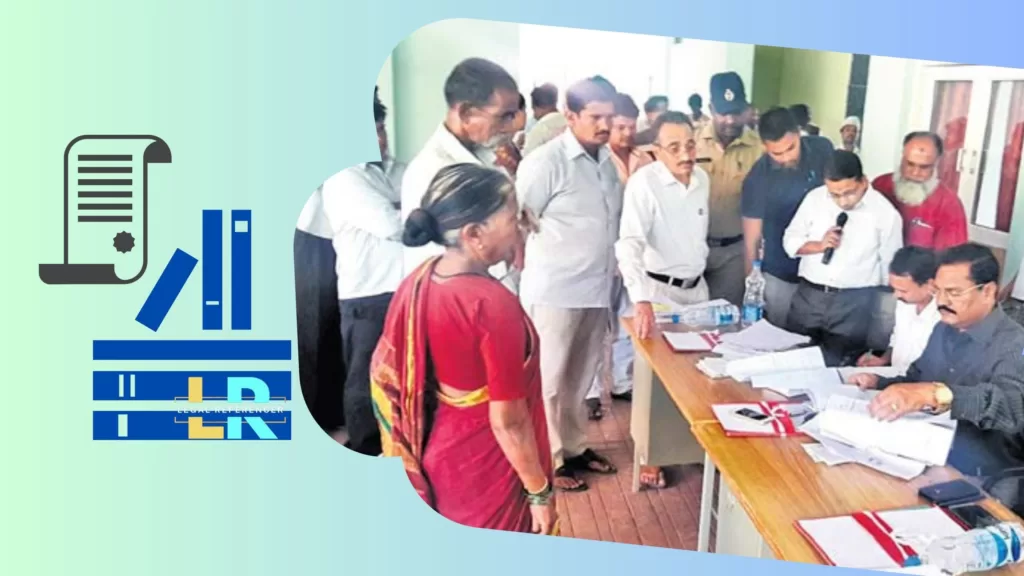
Procedure of Lok Adalat
How to Get the Case Referred to the Lok Adalat for Settlement
If you have a pending case before any court or have any dispute at pre-litigative stage and want to initiate a legal process, you may opt for Lok Adalat, below is how to get your case referred to the Lok Adalat for settlement.
Step 1: Suitability of the Case
The first step is to determine whether your case is suitable for resolution through the Lok Adalat. Lok Adalats primarily handle civil cases, including disputes related to property, family matters, labor disputes, and motor accident claims. Criminal cases, matters involving serious offenses, and cases where the law does not allow for a compromise cannot be referred to Lok Adalats.
Step 2: Consent of Parties
it is essential that all the parties involved in the dispute must agree to refer the case to the Lok Adalat. No matter shall be referred to lok adalat without free consent of both the parties. Consent can be given either at the stage of pre-litigation that is before filing a case in court or even during the court proceedings before the regular court.
Step 3: Application for Referral
To get your case referred to the Lok Adalat, you need to file an application in the appropriate court. The application should be in proper format. Formats of application for lok adalats are available with the court clerk. You may also take legal help from the lawyer for the format. The appication shall include the details such as facts of the case, the parties involved and the nature of the disagreement etc. You can also obtain advice from a lawyer or approach the court clerk for assistance in preparing the application.
Step 4: Evaluation by the Court
After the application is filed, the court considers its merits and decides if the case should be sent to the Lok Adalat. The court may before considering the matter may examine the criteria such as the nature of the dispute, the willingness of the parties, and the stage of the proceedings. If the court finds the case is appropriate for the Lok Adalat, it will issue an order referring the case to the Lok Adalat.
Step 5: Lok Adalat Proceedings
After referring the case to the Lok Adalat, the court may provide notice to both parties concerned, advising them of the date, time, and location of the Lok Adalat proceedings. Both parties are obligated to attend the Lok Adalat hearings on the appointed date. The Lok Adalat functions in a casual and participative manner, allowing parties to present their points, negotiate, and reach an agreement.The Lok Adalat bench, comprising judicial officers and other members, facilitates the resolution process and ensures fairness.
Step 6: Conciliation and Mediation
The Lok Adalat panel, comprising a judicial officer and other experts, facilitates conciliation and mediation between the parties. They encourage open communication and guide the parties towards a mutually agreeable settlement.
Step 7: Settlement and Award
If an agreement is reached between the parties during the Lok Adalat proceedings, it is recorded as a settlement. The settlement agreement has the same legal validity and enforceability as a court decree. If the parties fail to reach a settlement and act as per the settlement deed, then the case will be referred back to the regular court for further regular proceedings as per the law.
Step 8: Implementation of Settlement
Once a settlement is reached in the Lok Adalat, it is binding on the parties. The settlement is implemented by the regular court as per the terms agreed upon.
Step 9: Enforceability
The settlement reached in Lok Adalat is final and binding. It has the same legal standing as a decree passed by a civil court, making it enforceable through execution proceedings.
Step 10: Non-Settlement Cases
If a case does not reach a settlement in Lok Adalat, it is referred back to the appropriate court for further proceedings. The proceedings and discussions held during the Lok Adalat are not admissible as evidence in the subsequent court proceedings.
By following these steps, you can get your case referred to the Lok Adalat for settlement.
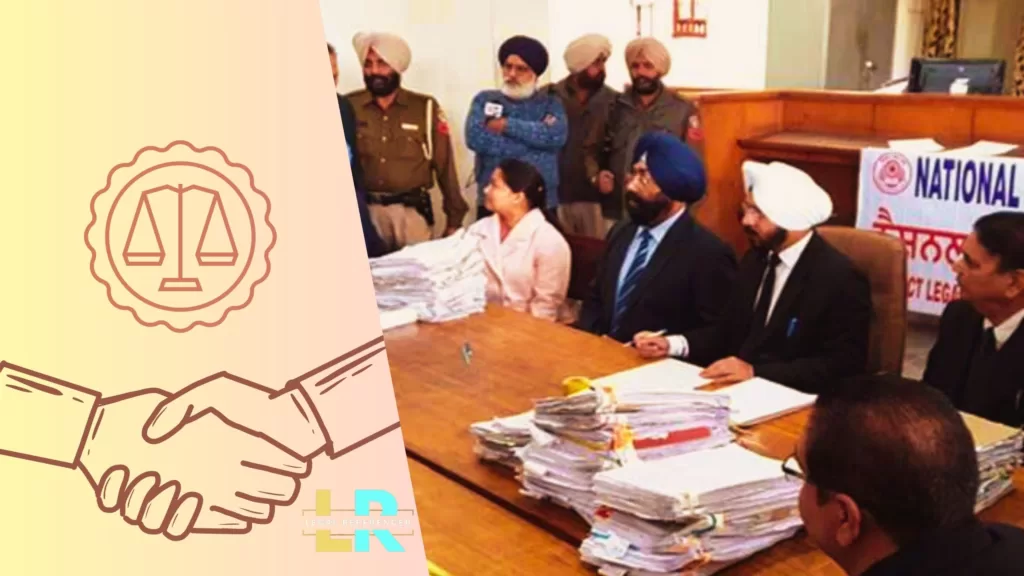
Lok Adalat vs. Formal Court Proceedings
Benefits of Lok Adalat
Lok Adalats provide an alternative approach to resolving disputes, distinguishing themselves from formal court proceedings in several ways:
- Speedy Resolution: Lok Adalats prioritize expeditious disposal of cases and aim to provide justice swiftly. Unlike formal courts, where cases can linger for years, Lok Adalats offer a platform for prompt resolution.
- Informal Setting: The environment of Lok Adalats is less formal and intimidating compared to traditional courtrooms. Parties can freely express their grievances, facilitating open dialogue and promoting settlement.
- Conciliatory Approach: Lok Adalats focus on conciliation and compromise, encouraging parties to arrive at a mutually acceptable solution. In contrast, formal court proceedings are more adversarial in nature, with a judgment delivered by the court based on legal principles and evidence.
- Cost-effective: Participating in Lok Adalats is cost-effective, as there are no court fees or elaborate legal procedures involved. This makes justice accessible to all, irrespective of their financial capabilities.
Criticisms and Challenges
While Lok Adalats have proven to be effective in many cases, they are not without criticisms and challenges. Some of the common criticisms include:
- Limited Jurisdiction: Lok Adalats can only handle cases that are compoundable and do not involve serious offenses.
- Lack of Legal Expertise: As Lok Adalats focus on amicable settlement, there might be instances where the decisions lack legal depth or nuanced understanding.
- Limited Awareness: Many individuals, especially from marginalized communities, are unaware of the existence and benefits of Lok Adalats, hindering their access to justice.
- Enforcement Issues: Ensuring compliance with the decisions of Lok Adalats can sometimes be challenging, requiring additional efforts for effective implementation
Conclusion
The procedure of Lok Adalat in India provides a valuable avenue for individuals to resolve their legal disputes swiftly and amicably. By emphasizing conciliation and compromise, Lok Adalats offer a more accessible and cost-effective alternative to the formal court system. The unique features and benefits of Lok Adalats have led to their widespread adoption and success in resolving a diverse range of cases.
We looked into the origins, operation, and major characteristics of Lok Adalats in India in this article. We went over the method step by step, highlighted the contrasts between Lok Adalats and official court proceedings, and gave light on the Lok Adalat panel’s responsibilities. Furthermore, we have answered frequently asked questions about Lok Adalats, clarifying their scope, enforceability, and the requirement for legal representation.
Lok Adalats play a vital role in ensuring access to justice for all citizens, particularly those who face barriers in navigating the complexities of the formal legal system. The procedure of Lok Adalat in India serves as a beacon of hope, offering a simplified and expedited path to dispute resolution. By opting for Lok Adalat, individuals can experience the benefits of an efficient, cost-effective, and people-centric approach to justice.
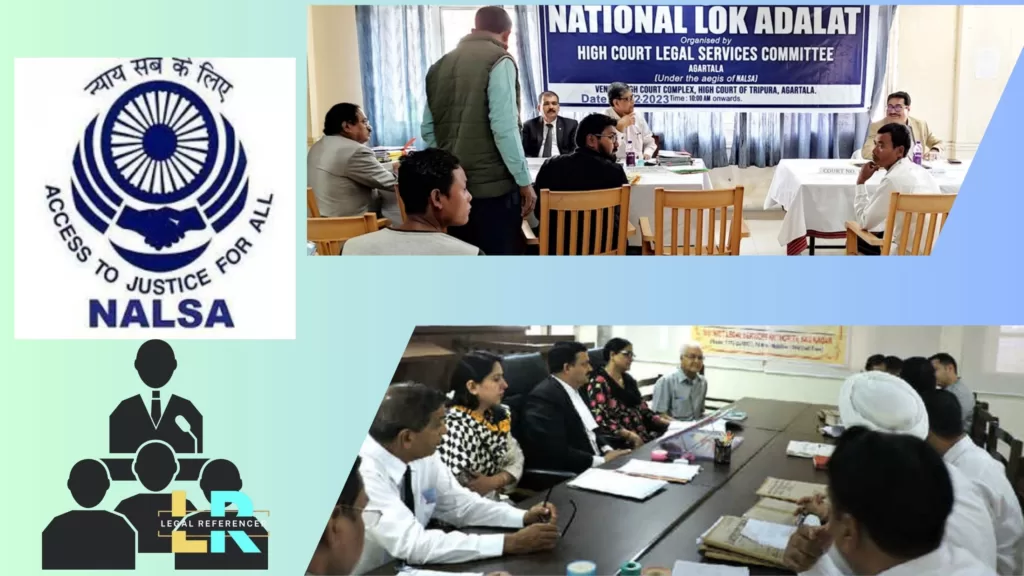
Landmark Judgements on Lok Adalat
- Salem Advocate Bar Association v. Union of India (2005): In this landmark judgment, the Supreme Court of India emphasized the significance of Lok Adalats as an effective alternative dispute resolution mechanism. The court held that the awards passed by Lok Adalats have the same enforceability as that of a decree of a civil court, and the parties cannot challenge or appeal against such awards.
- Afcons Infrastructure Ltd. v. Cherian Varkey Construction Co. Pvt. Ltd. (2010): The Supreme Court, in this case, held that even in cases where the jurisdiction of the civil court is ousted, the jurisdiction of the Lok Adalat to decide the matter is retained. It emphasized that the purpose of Lok Adalat is to provide speedy resolution of disputes and ensure amicable settlements.
- State of Punjab v. Jalour Singh (2008): In this case, the Supreme Court clarified that the jurisdiction of the Lok Adalats extends to both civil and criminal cases, including compoundable offenses. The court emphasized the importance of Lok Adalats in reducing the burden on courts and promoting conciliation between parties.
- State of Haryana v. Bhajan Lal (1992): Although not specifically related to Lok Adalats, this landmark judgment by the Supreme Court recognized the importance of alternative dispute resolution mechanisms, including Lok Adalats. The court held that in appropriate cases, where the dispute is of a civil nature, the court should make efforts for settlement through Lok Adalats or other alternative means before proceeding with regular litigation. This judgment paved the way for the promotion and utilization of Lok Adalats in resolving disputes.
FAQs:
Q1: What types of cases can be referred to Lok Adalat?
A: Lok Adalats can handle a wide range of civil and criminal cases, including matrimonial disputes, property disputes, motor accident claims, cheque bounce cases, and even compoundable criminal offenses. However, certain categories of cases, such as non-compoundable criminal offenses and those involving serious offenses, may not be eligible for resolution in Lok Adalat.
Q2: Can the decision of the Lok Adalat be challenged in a regular court?
A: The decision of the Lok Adalat, if reached through mutual consent and recorded as a settlement agreement, is considered final and binding on all parties. It has the same legal status as a decree of a civil court. However, if a case referred to Lok Adalat does not reach a settlement, it can be transferred back to the appropriate court for further proceedings.
Q3: Is legal representation necessary in Lok Adalat proceedings?
A: While legal representation is not mandatory in Lok Adalat proceedings, parties have the option to be accompanied by their advocates if they wish to do so. Advocates can provide guidance and legal advice during the process. However, the emphasis in Lok Adalats is on conciliation and mediation, and parties are encouraged to directly engage in negotiations to reach a settlement.
Q4: How long does it usually take to resolve a case in Lok Adalat?
A: One of the key advantages of Lok Adalats is the speedy resolution of cases. The duration can vary depending on the complexity of the dispute and the willingness of the parties to reach a settlement. Some cases can be resolved in a single sitting, while others may require multiple sessions. However, the overall time taken in Lok Adalat proceedings is significantly shorter compared to traditional court proceedings.
Q5: Are the discussions and proceedings in Lok Adalat confidential?
A: Yes, the discussions and proceedings in Lok Adalat are conducted in a confidential manner. The aim is to create a safe space for parties to openly discuss their issues and explore settlement options without fear of their statements being used against them in subsequent court proceedings. The confidentiality ensures that parties can freely express their concerns and work towards finding a resolution.
Q6: Are there any fees involved in approaching Lok Adalat?
A: No, there are no court fees or elaborate legal procedures involved in approaching Lok Adalat. The services provided by Lok Adalats are free of cost, making justice accessible to all sections of society. This eliminates the financial burden associated with traditional litigation and promotes the principle of equal access to justice.
Q7: How are Lok Adalats different from regular courts?
A: Lok Adalats differ from regular courts in their informal atmosphere, emphasis on amicable settlement, and the involvement of social workers and experts in the resolution process.
Q8: Are the decisions of Lok Adalats legally binding?
A: Yes, the decisions of Lok Adalats are legally binding on the parties involved,

